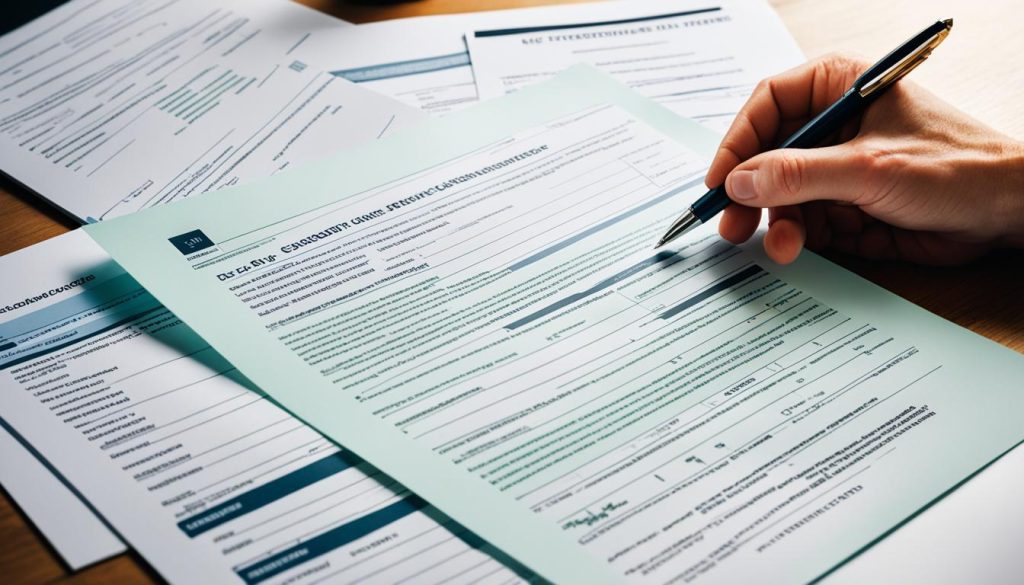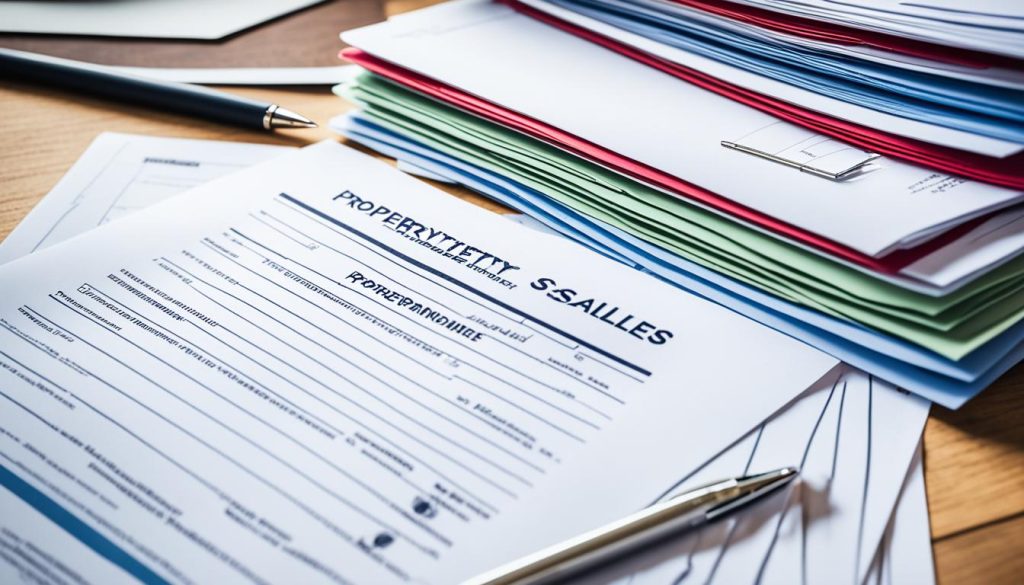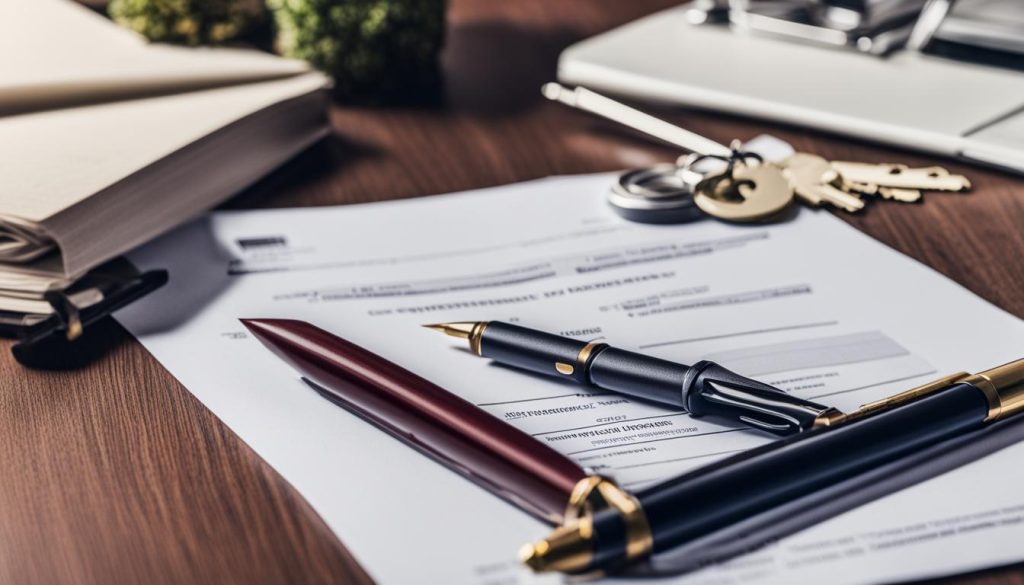When it comes to selling a house in the UK, it’s essential to make sure you have all the necessary paperwork in order. Whether you’re a first-time seller or have sold properties before, understanding the required documents is crucial for a smooth and successful transaction.
In this comprehensive guide, we will walk you through the paperwork needed to sell a house in the UK, providing you with a step-by-step checklist to ensure you have everything in order. From legal documents to administrative paperwork, we’ve got you covered.
There are various legal requirements and administrative steps involved in selling a house, and having the right documentation is key to a seamless selling process. As a responsible seller, it’s important to meet all the legal obligations and provide the necessary disclosures to potential buyers.
In the next sections, we will explore the different legal documents you need to be familiar with, provide you with a checklist of required paperwork, and discuss the importance of seeking professional advice throughout the selling process.
Are you ready to dive into the world of selling a house in the UK and discover the necessary documents? Let’s get started!
Understanding the Basics: Legal Documents for Selling a House in the UK
Before putting your house on the market, it’s important to familiarize yourself with the legal documents required for selling a house in the UK. These documents establish ownership, confirm legal compliance, and provide necessary disclosures to potential buyers.
When selling a property in the UK, there are several key legal documents that you need to have in order. These documents serve as evidence of ownership and protect both the seller and the buyer throughout the transaction. Understanding the purpose and significance of these documents will help ensure a smooth and successful sale.
Here are some of the essential legal documents you need when selling a house in the UK:
Evidence of Ownership
- Property Title Deeds
- Land Registry Documents
Compliance and Disclosures
- Energy Performance Certificate (EPC)
- Fire Safety Documentation
- Gas Safety Certificate
- Electrical Safety Certificate
- Planning Permission and Building Regulation Compliance
Financial and Legal Obligations
- Mortgage Documents
- Leasehold Agreement (if applicable)
- Insurance Policies
- Utility Bills and Service Charges
These are just a few examples of the legal documents you may need to sell your house in the UK. Each document serves a specific purpose and ensures that the transaction is conducted in compliance with the law.
Next, we will take an in-depth look at each of these documents, explaining their role in the selling process and providing valuable insights to help you navigate through the paperwork with ease.

Understanding the Role of Legal Documents
Legal documents play a critical role in the selling process as they provide the necessary information and protection for both the seller and the buyer. Let’s explore why each document is important:
Property Title Deeds:
Property title deeds establish ownership and provide proof that you have the legal right to sell the property. They contain information about the boundaries, any restrictions, and any rights associated with the property.
Land Registry Documents:
Land Registry documents confirm the details of the property’s ownership and any registered charges or restrictions. These documents help ensure transparency and protect the buyer’s interests.
Energy Performance Certificate (EPC):
An EPC provides important information about a property’s energy efficiency. It is a legal requirement to have an EPC before marketing the property for sale, and it helps potential buyers make informed decisions.
Fire Safety Documentation:
If your property has been converted into multiple dwellings, fire safety documentation is essential. This includes fire risk assessments, safety measures, and evacuation plans to ensure the safety of occupants.
Gas Safety Certificate:
A gas safety certificate is required if your property has gas appliances. It confirms that the gas appliances and installations are safe and comply with regulations.
Electrical Safety Certificate:
An electrical safety certificate verifies that the electrical installations within the property are safe and meet all required standards.
Planning Permission and Building Regulation Compliance:
If you’ve made any alterations or extensions to your property, you may need planning permission and building regulation compliance certificates. These documents ensure that the changes were carried out legally and meet safety standards.
Mortgage Documents:
If you still have a mortgage on the property, you will need to provide the necessary mortgage documents to confirm the outstanding balance and any restrictions on transferability.
Leasehold Agreement:
If your property is leasehold, you’ll need the leasehold agreement, which outlines the terms and conditions of the lease, including any ground rent or service charges.
Insurance Policies:
Providing information about your property’s insurance policies helps potential buyers understand the coverage and costs associated with the property.
Utility Bills and Service Charges:
Utility bills and service charge information give potential buyers an idea of the ongoing costs they can expect if they purchase the property.
By understanding the purpose and significance of each legal document, you can ensure that you have all the necessary paperwork in order before listing your house for sale. This will help you avoid delays and complications in the selling process, providing peace of mind for both you and potential buyers.
Gathering the Required Documents: Checklist for Selling a House in the UK
When selling your house in the UK, it’s essential to have all the necessary paperwork in order. This comprehensive checklist will guide you through the documents you need to gather, ensuring a smooth and successful transaction.
1. Property Title Deeds
These legal documents establish your ownership of the property and include details such as boundaries, rights of way, and any existing mortgages. Ensure you have the original title deeds or a copy issued by the Land Registry.
2. Energy Performance Certificate (EPC)
An EPC is a requirement when selling a property in the UK. It provides information about the energy efficiency of your home, helping potential buyers make informed decisions. Include a valid EPC with a minimum energy efficiency rating of “E” or above.
3. Property Information Form
This form contains important details about your property, including boundaries, disputes, any ongoing works, and guarantees for fixtures and fittings. Fill out this form accurately, providing transparent information to potential buyers.
4. Fittings and Contents Form
This form outlines which fixtures, fittings, and appliances are included in the sale of your property. Clearly specify what items are being sold with the house to avoid any confusion or disputes during the transaction.
5. Planning Permission and Building Regulations Documentation
If you have made any structural changes or obtained planning permission for future development, gather the relevant documentation to demonstrate compliance with planning and building regulations.
6. Council Tax Information
Provide the latest council tax information to potential buyers, including the banding and payment details for the property. This will help them understand their financial obligations and make informed decisions.

7. Mortgage and Finance Documentation
If you have an outstanding mortgage or any other finance arrangements on your property, collect the relevant documentation. This includes mortgage statements, loan agreements, and details of any charges or restrictions.
8. Guarantees and Certificates
Compile all relevant guarantees and certificates for any work carried out on the property, such as a boiler warranty or electrical installation certificate. These documents provide reassurance to buyers about the quality and condition of the property.
9. Leasehold Documentation (if applicable)
If your property is leasehold, gather the lease agreement, service charge and ground rent details, and any other relevant documentation. This will ensure transparency and clarity for potential buyers.
10. Other Documentation
Compile any additional documents that may be relevant to your property, such as insurance policies, maintenance records, or planning permission for an extension. Providing comprehensive documentation adds value and credibility to your property.
By gathering these essential documents, you can streamline the selling process and instill confidence in potential buyers. Remember to keep both digital and physical copies of these documents for easy accessibility and reference.
Consulting Professionals: Expert Advice and Support for Selling a House in the UK
When it comes to selling a house in the UK, seeking professional advice and support from experts such as solicitors, estate agents, and surveyors can be highly beneficial. These professionals have extensive knowledge and experience in the real estate industry and can guide you through the selling process, ensuring a smooth and successful transaction.
An estate agent plays a crucial role in marketing your property and finding potential buyers. They have access to a wide network and can help you set the right asking price, effectively advertise your house, and negotiate with prospective buyers. Additionally, estate agents can provide valuable insights into the current market conditions, helping you make informed decisions.
A solicitor or conveyancer is essential for handling the legal aspects of selling a house. They will ensure that all necessary documentation is prepared and submitted correctly, including the contracts, property title deeds, and any necessary disclosures. A solicitor will also handle the exchange of contracts and the transfer of ownership, ensuring the transaction is legally binding and secure.
Depending on the condition or type of property you are selling, a surveyor may be required. They can assess the structural integrity of your house, identify any potential issues, and provide an accurate valuation. This information is valuable for both you and potential buyers, as it gives an understanding of the property’s condition and any repairs or renovations that may be needed.
Remember that each professional may have specific requirements for documents and paperwork relating to the sale. It is essential to communicate openly and provide them with all the necessary information and documentation they need. This cooperation will streamline the process and ensure a successful outcome.

Professionals Involved in Selling a House in the UK
| Professional | Role |
|---|---|
| Estate Agent | Market property, find buyers, negotiate |
| Solicitor/Conveyancer | Handle legal aspects, prepare contracts, ensure compliance |
| Surveyor | Assess property condition, provide valuation |
By working with these professionals and providing them with the necessary documents and information, you can navigate the selling process more efficiently and with expert guidance. Their expertise will not only save you time and effort but also increase your chances of achieving a successful sale at the best possible price.
Conclusion
Selling a house in the UK can be a complex process, but with careful attention to the necessary paperwork and documents, you can ensure a successful transaction. Understanding the legal and administrative requirements is crucial, as it allows you to gather and prepare the necessary documentation to show potential buyers and meet legal obligations.
Remember to consult professionals such as solicitors, estate agents, and surveyors to guide you through the process and provide expert advice. These professionals can help you navigate the paperwork maze and ensure you have all the correct documents in place.
By following the required steps, gathering the required documents, and seeking professional support when needed, you can minimize stress and ensure a smooth and hassle-free selling process. Remember, compliance with legal obligations and attention to detail are key to making your house sale a seamless and successful experience.
FAQ
What paperwork do I need to sell my house in the UK?
When selling a house in the UK, you will need several key documents, including proof of identity, property title deeds, Energy Performance Certificate (EPC), property information form, fixtures and fittings list, and any relevant planning permission or building regulation certificates. It is also advisable to have a comprehensive list of property boundaries, any guarantees or warranties, and documents related to any ongoing disputes or agreements. Consulting a solicitor or conveyancer will ensure you have all the necessary paperwork and help you navigate through the process smoothly.
What are the legal documents required for selling a house in the UK?
The legal documents required for selling a house in the UK include the property title deeds, which establish ownership and provide details of any mortgages or restrictions on the property. You will also need an Energy Performance Certificate (EPC), which shows the energy efficiency of your property. Additionally, you may need a property information form, a fixtures and fittings list, and any relevant planning permission or building regulation certificates. Your solicitor or conveyancer will guide you through the process and ensure all legal documents are in order.
What documents do I need to gather when selling a house in the UK?
To sell a house in the UK, you will need to gather various documents, including proof of identity (such as a passport or driving license), property title deeds, an Energy Performance Certificate (EPC), property information form, fixtures and fittings list, and any relevant planning permission or building regulation certificates. It is also important to have a comprehensive list of property boundaries, any guarantees or warranties, and documents related to ongoing disputes or agreements. Gathering these documents in advance will streamline the selling process.
Should I consult professionals when selling a house in the UK?
Yes, consulting professionals such as solicitors, estate agents, and surveyors is highly recommended when selling a house in the UK. These experts have the knowledge and experience to guide you through the legal and administrative requirements. They can help you prepare the necessary paperwork, market your property effectively, negotiate offers, and ensure a smooth transaction. Additionally, professionals may require additional documents or paperwork specific to your circumstances, so it’s important to seek their advice and support.






